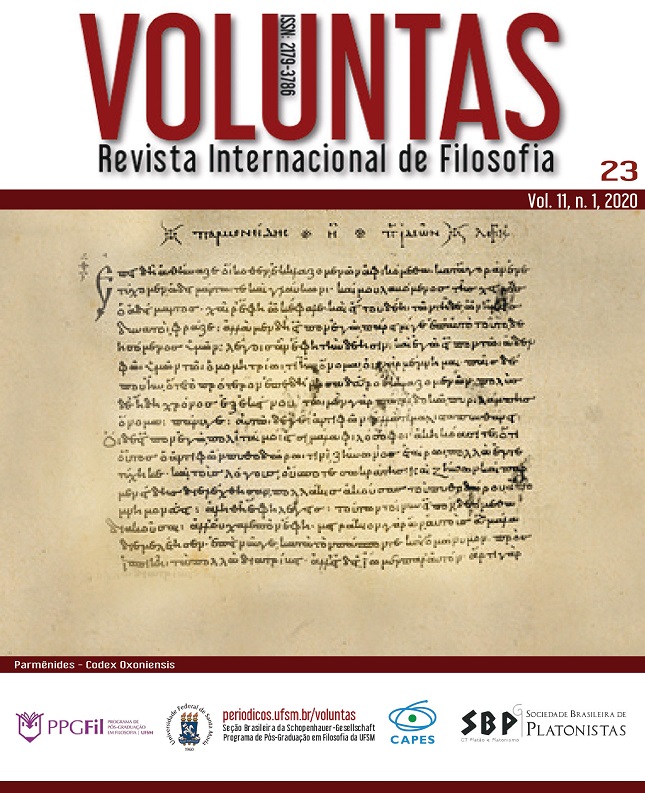The “Parmenides” and the unwritten doctrines of Plato: the One and the Other
DOI:
https://doi.org/10.5902/2179378643315Palabras clave:
Parmenides, Plato, Unwritten doctrinesResumen
Cornford (in his Plato and Parmenides: Way of truth and Plato's Parmenides) says that the Parmenides dialogue begins "the series of works in which Plato for the first time confronts his own doctrine with the main systems of his predecessors and submits them to a critical examination "(p.63). Yes, but it is even more so: the reconstruction of the dialogue in the light of the hermeneutic method of Tübingen-Milan leads us to gather the structure in which the ontological vision on three levels intersect, from the physical world to the Ideas and from the Ideas to the First Principles. The key element of structural development is not only theoretical but also dramatic, it is the link between the two sides of the dialogue. Only the unity between the two parts makes the dialectical course recorded in the text plausible and justifiable. The first part of Parmenides brings the theory of Ideas, but gives up a Protology. Nevertheless, a complete view of the text brings into play the One and the Other/Other, foundations of the supreme Principles. The aim here is to bring to light the structural links of argument that leads us to a totalizing view of reality in PlatoDescargas
Citas
ARISTOTELE, La Metafisica. A cura di REALE, G. Milano: Rusconi, 1994.
ARISTOTELE, La Fisica. Bari: Laterza, 1968.
BERTI, E. Struttura e significato del Parmenide di Platone. Giornale di Metafisica 26, 1971, pp. 495-527.
COLLI, G. La Goliardica Pisa 1950 (aulas do curso de História da Filosofia Antiga do ano acadêmico 1949-1950).
CORNFORD, F. Plato and Parmenides. Way of truth and Platos’s “Parmenides”. London: K. Paul, Trench, Trubner & co. Ltd., 1964. Reprinted by Routledge & Kegan Paul, 1980.
HAPP, H. Studien zum aristotelischen Materie-Begriff, Berlim-New York, 1971.
KRÄMER, H. Platone e i fondamenti della metafisica. Milano: Vita e Pensiero, 2001.
MIGLIORI, M. Dialettica e Verità: Commentario filosofico al “Parmenide” di Platone. Milano: Vita e Pensiero, 2000.
MIGLIORI, M La scuola di Tubinga-Milano per una nuova immagine di Platone. Breve inquadramento storico dell’interpretazione platonica della scuola di Tubinga-Milano (Krämer, Gaiser, Reale, Szlezák). Il Cannocchiale Rivista di Studi Filosofici 1, 1992, pp. 121-142.
PLATO, Complete Works. Indianapolis/Cambridge: Hackett1997.
PLATO, Platonis Opera. BURNET, J. (ed.). Oxford: Clarendon, 1892-1906. (Várias edições)
PLATO, Tutti gli Scritti. REALE, G. (ed.). Milano: Bompiani, 2000.
REALE, G. Para uma nova interpretação de Platão. Trad. de Marcelo Perine. São Paulo: Loyola,1997.
SZLEZÁK, Th. A. La Repubblica di Platone: I libri centrali. Brescia: Morcelliana, 2003.
XAVIER, D.G. A República de Platão e as operações henológicas da Idéia de Bem. Síntese, Belo Horizonte, v. 34, 2007, pp. 247-260.
XAVIER, D.G. Como não ler Platão! Revista Archai: Revista de Estudos sobre as Origens do Pensamento Ocidental, v. 6, 2011-1, pp. 93-98.
XAVIER, D.G. Epékeina tês ousias: o Uno-Bem na República de Platão. In: XAVIER, D.G.; CORNELLI, G. (Orgs.). A República de Platão: Outros olhares. São Paulo: Loyola, v. 1, 2011-2, pp. 227-238.
XAVIER, D.G. Para uma leitura alternativa de Platão. Educação e Filosofia, Uberlândia, v. 19, 2005-2, pp. 145-157.
XAVIER, D.G. Para uma metafísica platônica à luz da "Tradição Indireta". Hypnos, São Paulo), v. 15, 2005-1, pp. 117-128.
Publicado
Cómo citar
Número
Sección
Licencia
La sumisión de los originales para este periódico implica la transferencia, por parte de autores, de los derechos de publicación impresa y digital. Los derechos autorales para los artículos publicados son del autor, con derechos del periódico sobre la primera publicación. Los autores sólo podrán utilizar los mismos resultados en otras publicaciones indicando claramente este periódico como el medio de publicación original. En virtud de ser un periódico de acceso abierto, está permitido el uso gratuito de los artículos en aplicaciones educacionales, científicas, no comerciales, desde que referenciada la fuente (por favor, vea la licencia Creative Commons en el pie de página de este periódico).






